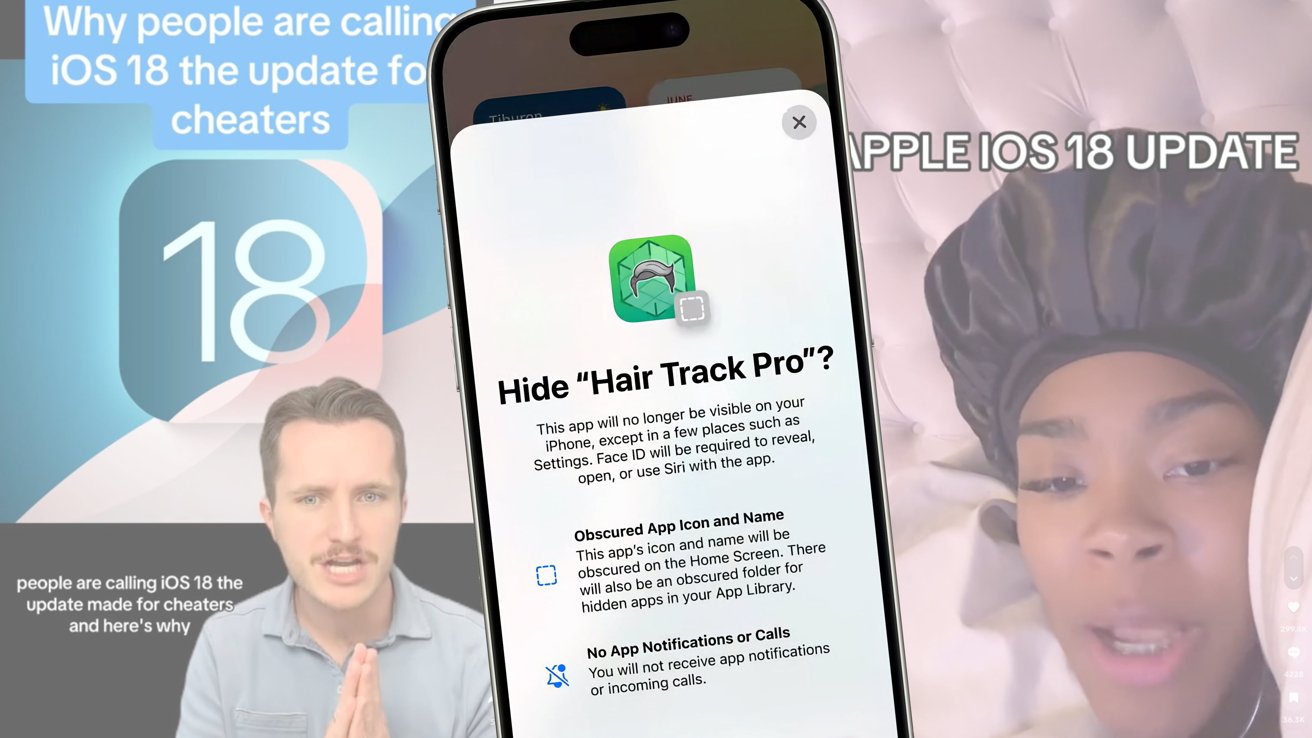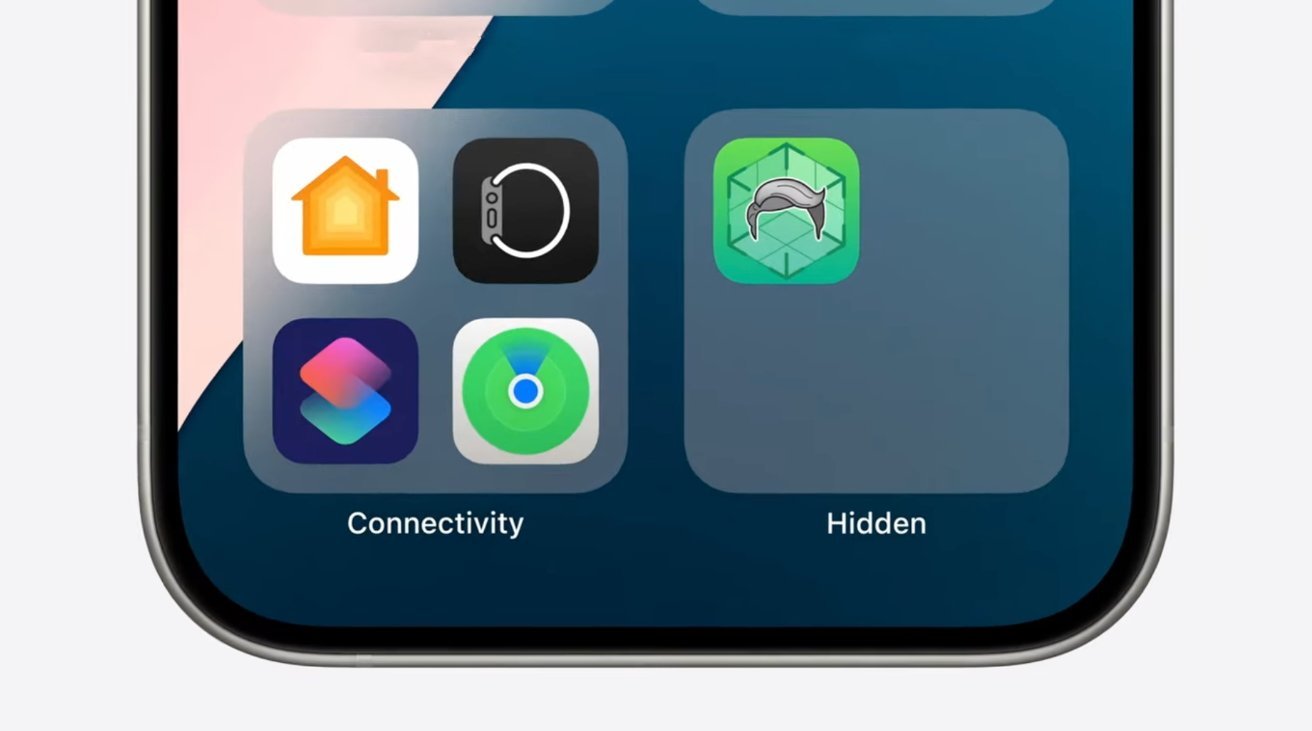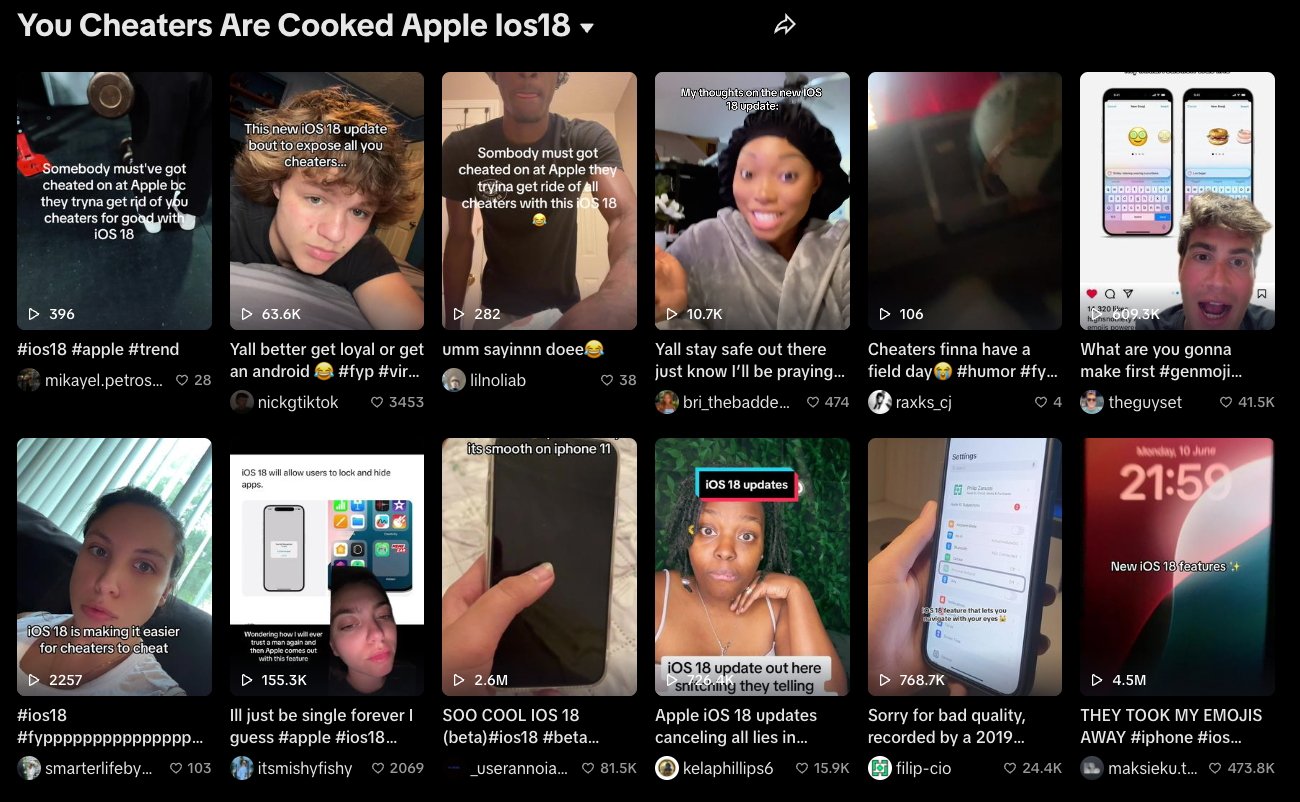Social media "influencers" are inventing scenarios and features for iOS 18 that they're screaming makes it the prime operating systems for cheaters. This was more ignorant than normal in June, but with iOS 18 out, it's back with a vengeance.
Following the introduction of Apple's operating system updates at the WWDC keynotes, people started to offer their opinions on Apple's feature changes. Many are balanced opinions from tech YouTubers, specialist publications like AppleInsider, our friends at other Apple-centric publications, analysts, and other industry observers.
However, there ware also unhinged and uninformed hot takes on social media. Following the release of iOS 18 to the public, these complaints bubbled back up.
Back in June, the TikTok brain trust insisted that Apple is making the iPhone more useful for cheaters. A large number of videos on TikTok and other social platforms have latched onto the hidden apps and lockable apps features on iOS 18, and have let their imaginations run rampant.
As the name suggests, locked apps prevents anyone with access to the iPhone from opening up specific apps that were locked by the user. Face ID is required to actually access the app, stopping anyone from getting in if they happened upon the device when it's unlocked.
Hidden apps goes one stage further, in hiding the app from view. When hidden, the app's notifications will be muted, it won't appear in search or Spotlight suggestions, and it will be mostly invisible save for some references in Settings.
After September's introduction, the claims resurfaced, with a similar level of anger and misguidance.
In a collection of complaints by Yahoo, users on X are reiterating that the locking and hiding of apps is great for adulterers. "iOS 18 update was designed by a cheater for sure," one X post states. Another offered that iOS 18 "are gonna make these birds cheat" and that "Relationships are dead."
The content wheel turns
In many examples of social media commentary, especially on TikTok, accounts immediately insinuated that the ability to lock or hide apps is tool that could be abused by cheaters. And, they madeg up features that don't exist to try and prove their point.
Across multiple hot takes, TikTok personalities said that the iPhone will be a "cheater's paradise," since it becomes easier to prevent snooping through a partners phone. It was proposed that someone's partner could have a secret Tinder or Bumble profile, hiding the apps from view.
Often, there are insinuations that this is a red flag in a relationship. Especially in situations where one partner suspects the other of being unfaithful and requests to check through their device for proof.
The belief is that, while a single biometric measure or passcode was all that was protecting a device from snooping, it's now worse. A cheater could hand over their device unlocked, but have the apps they use safely hidden away.
You know, like it's been on Android for five years or more, depending on branch.
The worst of the videos proposed that some hypothetical cheater at Apple wanted to create more tools for their own activities. In some of the more egregious videos, they claimed that if the wrong face is detected, apps will automatically lock and hide. Ridiculous.
Another particularly stupid claim from the TikTok wave was there's the ability to see sent message counts, and reply numbers in Messages. Also ludicrous.
They also insisted that Apple can apparently only do one thing at a time, and did this app locking instead of making more practical updates. Accompanied by dance, sometimes, they said that the time was wasted instead of making a better front-facing camera or providing more storage capacity.
News flash. The software and hardware teams aren't a finite pool of 10 people. Different departments have different priorities and bailiwicks. Apple didn't decide to do this instead of anything else, and the feature in software had absolutely no impact on the camera teams at all.
It's worth bearing in mind that, there is a need for TikTok accounts to post news or opinions regularly and truth is not strictly necessary. The more posts are made, the more views they get, the more the algorithms spread their opinions.
These furious hot takes for traffic don't bother with the facts. They also didn't tend to delve into Apple's nature of being a privacy-first company. It's a quick claim, and a juicy one, that is easy to fire off into the ether.
Sometimes, it's a simply-made retelling of opinions from elsewhere, all to generate content, clicks, fame, and maybe a bit of money.
There are legitimate uses
Apple's functions do have many real, genuine use cases, which are not touched on at all by the influencer brigade.
For a start, you could imagine good reasons why a person could be on a dating app, but keep the app hidden. Aside from cheaters, it could easily be a person who hasn't come out to their family but is fearful of what could happen if they are found out.
More frivolously, hiding an app prevents friends and others from opening it and playing around with a person's dating profile. There's also a lot of mileage to be made by bullies and meaner members of a friend group discovering someone's trying to find love online.
Away from dating apps, you could also consider other vulnerable people who need to keep their lives locked down. People of interest to major organizations, such as foreign governments or criminal gangs, could use the same tools to cover their online tracks.
It's plausible an activist may want to keep their encrypted communications app hidden from view. For example, so it doesn't get accessed when someone inspects their device at a security checkpoint.
For parents, they may not want children to access their Slack account while handing their iPhone over to watch YouTube videos on a train.
There are so many reasons why a person would legitimately want to hide apps, or prevent access without an extra unlock. Far more than those about cheating.
If the prospect of hiding apps forces some users to rethink what devices they use, they can't simply jump ship to Android. You can hide apps on that platform too. For years.
Cheaters gotta cheat
There have always been ways for cheaters to hide. Before the dawn of smartphones, there have been ways to minimize communications.
And, there's folks who have failed to do so.
Take for example the British man who, in reports from June 13, planned to sue Apple because his wife divorced him. He was caught cheating because, despite deleting messages sent to prostitutes from his iPhone, his wife read them on the family iMac.
Had he used a different mobile device with entirely separate accounts, it could've been a different story. Instead, he lost over 5 million pounds ($6.37 million) in a costly divorce.
Ultimately, Apple's iOS 18 changes won't cause someone to cheat, give them the idea to, or to get better at hiding unfaithfulness. It is a tool with many legitimate purposes, and a few unfortunate ones too.
You know, like the internet as a whole. And TikTok and X.
 Malcolm Owen
Malcolm Owen









-m.jpg)






 Christine McKee
Christine McKee


 Charles Martin
Charles Martin


 Mike Wuerthele
Mike Wuerthele



-m.jpg)






15 Comments
People want to be ‘famous’ and the many jackasses today who use social media for their moment in the sun just need to be ignored. One of the reasons I don’t have certain social media apps on my iPhone. Lots of trash out there. People found ways to hide their cheating before and that will continue. No doubt some may use the new feature to keep secrets. But as you well pointed out plenty of apps on my phone that will benefit from the new feature. All my financial apps come to mind.
No doubt about it, the bullshitosphere is definitely expanding at an exponential rate with no indications of it ever slowing down.
You forgot to mention that iMessages may out you to your wife by not deleting those messages from the Mac at home when you delete them from the iPhone.
Best. Lede. EVAH.